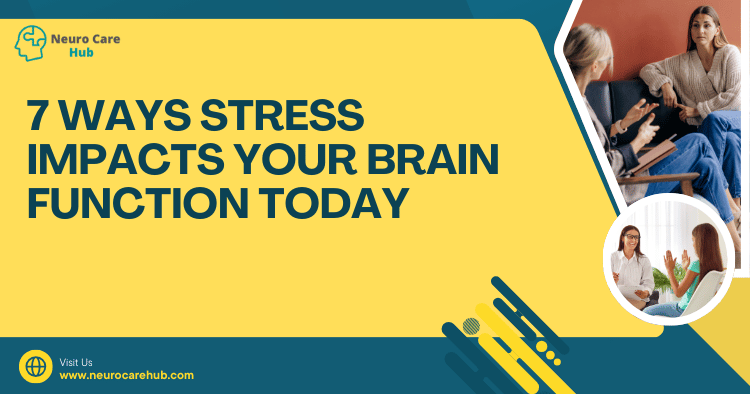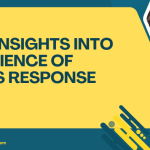Table of Contents
- Introduction
- 1. Stress and Memory
- 2. Stress and Decision-Making
- 3. Stress and Emotional Regulation
- 4. Stress and Focus
- 5. Stress and Learning Ability
- 6. Stress and Brain Aging
- 7. Stress and Mental Health
- Conclusion
Introduction
Stress is an unavoidable part of life, but understanding how it affects our brain function can empower us to manage it more effectively. From memory lapses to impaired decision-making, the impacts of stress can be both profound and far-reaching. In this article, we’ll explore seven significant ways that stress affects your brain function today, equipping you with the knowledge to recognize and mitigate its effects.
1. Stress and Memory
Stress can have a serious impact on both short-term and long-term memory. Research shows that elevated levels of the stress hormone cortisol can impair the hippocampus, the area of the brain responsible for forming new memories.
“Memory is not just about the past; it’s about how we navigate our present and future.”
How It Works:
- Acute Stress: Short bursts of stress can enhance memory formation in the short term. However, prolonged stress can lead to memory deficits.
- Chronic Stress: Over time, chronic stress can shrink the hippocampus, making it difficult to recall information or learn new things.
FAQs:
- Can stress make me forget things? Yes, stress can hinder memory formation and retrieval.
- How can I improve my memory under stress? Techniques like mindfulness meditation and regular physical activity can help reduce stress and improve memory function.
For more information on the relationship between stress and memory, refer to the insights on how stress affects overall brain function in Neuro Care: A Guide to Brain Health.
2. Stress and Decision-Making
When faced with stress, decision-making can become muddled. Acute stress may push people towards impulsive choices, while chronic stress can lead to indecision and anxiety.
“Decisions made in haste under stress can often lead to regret later.”
How It Works:
- Fight or Flight Response: Stress triggers the amygdala, which can lead to emotional decision-making rather than rational thought.
- Impaired Judgment: Elevated cortisol levels can diminish cognitive flexibility and critical thinking skills.
FAQs:
- Why do I make poor choices when stressed? Stress can affect logical reasoning and lead to emotional, rather than rational, decisions.
- How can I improve decision-making under stress? Practice deep-breathing exercises or take a short walk to clear your mind before making decisions.
For further reading on stress and decision-making, visit the American Psychological Association or explore the Top 5 Tips for Choosing the Right Neurologist for additional guidance.
3. Stress and Emotional Regulation
Stress can significantly affect how we manage our emotions. High stress levels can lead to heightened emotional responses, making it difficult to maintain composure.
“Emotional regulation isn’t about suppressing feelings; it’s about understanding and managing them.”
How It Works:
- Increased Reactivity: Stress can sensitize your emotional responses, leading to mood swings and irritability.
- Diminished Emotional Intelligence: Stress may impair your ability to empathize with others or to respond appropriately in social situations.
FAQs:
- Can stress cause mood swings? Yes, stress can lead to increased emotional reactivity and mood fluctuations.
- How can I manage my emotions during stressful times? Practicing mindfulness and engaging in regular physical activity can help regulate emotions.
For more on emotional regulation and stress, check out this Harvard Health article and consider the Top 5 Ways Family Support Enhances Neuro Recovery for strategies to bolster emotional resilience.
4. Stress and Focus
Stress often leads to a decrease in attention and focus, making it challenging to concentrate on tasks.
“Focus is not just about attention; it’s about clarity and purpose.”
How It Works:
- Cognitive Overload: When stressed, your brain is busy managing the stress response, leaving fewer resources for focusing on tasks.
- Distraction: Stress can make you more prone to distractions, causing lapses in concentration.
FAQs:
- Why can’t I focus when I’m stressed? Stress consumes cognitive resources, making it harder to concentrate on tasks.
- What can I do to improve my focus? Techniques such as time management, taking breaks, and practicing mindfulness can improve focus.
Learn more about stress and attention at the National Institute of Mental Health or check out the Top 5 Ways to Integrate Neuro Care into Your Wellness Routine for practical tips.
5. Stress and Learning Ability
When stress is present, learning new information can become a daunting task.
“Learning isn’t just about acquiring knowledge; it’s about how effectively we can process it.”
How It Works:
- Impaired Neuroplasticity: Chronic stress can hinder the brain’s ability to adapt and form new connections, which is essential for learning.
- Reduced Motivation: Stress can lead to decreased motivation to engage in learning activities.
FAQs:
- Can I still learn while stressed? It is possible, but stress can hinder the process.
- How can I enhance my learning despite stress? Break study sessions into smaller chunks and incorporate relaxation techniques.
For insights on stress and learning, check out this Mayo Clinic article and consider the Top 5 Lifestyle Changes for Better Neuro Health for ideas on maintaining a conducive learning environment.
6. Stress and Brain Aging
Chronic stress has been linked with accelerated brain aging, affecting cognitive functions and memory.
“Aging is inevitable, but how we manage stress can influence the pace.”
How It Works:
- Telomere Shortening: Stress can accelerate the shortening of telomeres, the protective caps on chromosomes, which is associated with aging.
- Neurodegeneration: Long-term stress can lead to neurodegenerative diseases, impacting memory and cognitive abilities.
FAQs:
- Does stress really age the brain? Yes, chronic stress can have lasting effects on brain health and aging.
- What can I do to protect my brain from stress? Regular exercise, a balanced diet, and stress management techniques can help.
For further exploration, refer to this research on stress and aging and check the Top 5 Challenges in Global Neuro Care Access Today for insights on brain health access and support.
7. Stress and Mental Health
The effects of stress on mental health are profound, contributing to conditions like anxiety and depression.
“Mental health is a delicate balance; stress can tip that scale.”
How It Works:
- Biochemical Changes: Stress affects neurotransmitter balance, which can lead to mood disorders.
- Vicious Cycle: Stress can trigger mental health issues, and mental health issues can increase stress, creating a feedback loop.
FAQs:
- Can stress lead to depression? Yes, chronic stress is a significant risk factor for depression.
- How can I manage stress for better mental health? Regular exercise, social support, and professional counseling can help mitigate stress’s effects.
For more on stress and mental health, visit the World Health Organization and explore the Top 5 Benefits of Support Groups for Neurological Patients for community support strategies.
Conclusion
Understanding the ways stress impacts brain function is the first step toward managing it effectively. By recognizing how stress affects memory, decision-making, emotional regulation, focus, learning ability, brain aging, and mental health, you can take proactive steps to mitigate its effects. Implementing stress-reduction strategies like mindfulness, physical activity, and seeking social support can help you lead a healthier, more balanced life. Remember, taking care of your mental health is just as important as taking care of your physical health!
“Sharing knowledge about stress is the first step towards creating a supportive community.”
Feel free to share this article with anyone.






